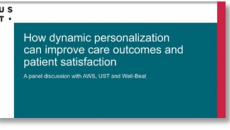Patient Engagement
The new telemedicine site offers extremely short wait times and enables providers to see nearly twice as many patients as they would in the same period for in-person visits. And it beats the overhead and infrastructure costs of a new physical location.
Dr. Colin Banas, chief medical officer at DrFirst, says mental health providers quickly adopted telehealth during the pandemic. Now he says he thinks AI agents can help understaffed offices with triage and prescription management.
Nursing leaders are embracing digital tools that streamline workflows and improve unique connections with patients, says Mary Joy Garcia-Dia, DNP, program director of nursing informatics at NewYork-Presbyterian Hospital and a HIMSS25 Changemaker Awardee.
Researchers and developers have announced artificial intelligence tools that aim to shrink the time mental health providers spend on administrative tasks, provide faster triage, support clinical decision-making and improve patient access.
Also, a private Cambodian hospital partnered with a commercial bank to enable mobile, automated payments.
SPONSORED
In an AMA study, nearly 63% of physicians reported regular symptoms of burnout – and they are increasingly feeling overwhelmed by documentation burdens and technology solutions that cause more problems than they solve.
SPONSORED
The World Health Organization estimates that adherence to long-term therapy for chronic illness in developed countries averages less than 50%.
SPONSORED
Research shows that social activities directly impact older adults’ mental and physical wellbeing. But the senior population spans a large range of abilities, healthcare needs and unique personalities.
A HealthLeaders-Infor survey reveals the critical workforce challenges in healthcare: High turnover, low employee satisfaction, and administrative burdens. These issues are compounded by a multi-generational workforce with diverse needs, all struggling with inefficient systems.
Modernizing your healthcare workforce management system can significantly free up valuable time and improve staff well-being.










